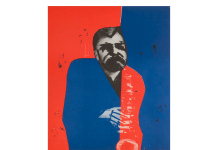In The Undisputed Truth, a one-man autobiographical show, former heavyweight boxer Mike Tyson offers a raw and revealing look into the often and misunderstood aspects of his life.
The Spike Lee-directed show ended its three-night stay in Los Angeles at the Pantages Theatre March 10.
In The Undisputed Truth, Tyson allows the audience to understand his life and the events in it from his own perspective and words.
A montage of video and picture footage of the former boxer’s life, along with his own descriptions of their significance, drives the show.
At the inception of the show, Tyson led the audience to Brownsville section of Brooklyn, the gritty neighborhood where he was born and raised. He revealed that it was in Brownsville that he had his first run-ins with fighting, gambling and the juvenile detention system.
He lived a life without much guidance or structure, until he met three-time heavyweight champion Muhammad Ali, who visited one of the juvenile detention centers where he was stationed. At that moment, Tyson knew that he wanted to be like Ali, he wanted to be “special.” Tyson soon teamed with trainer, mentor and father figure, Constantine “Cus” D’Amato to become the youngest world heavyweight titleholder in history.
Post-success, Tyson’s life went through many stages of ups and downs. He led the audience through his shaky eight-month marriage and subsequent divorce to actress Robin Givens, his rape conviction in 1992, biting off a piece of boxer Evander Holyfield’s ear and his cocaine abuse.
Despite his past actions, Tyson seemed charismatic and even slightly lovable. Throughout the roughly two-hour show, he kept the other audience members engaged; many laughed at his bluntness, cried at his heartbreak and were overjoyed at his success.
He seemed like a real person by honestly revealing his mistakes and owning up to them. That was something the audience could respect, evidenced by their applause, “awws,” and “oohs.” He jokingly took everyone back to each memorable event either with pride or by saying he, “messed up.”
For these reasons, I came to respect him and his struggle. I was especially driven by Tyson’s recollection of the death of his 4-year-old daughter, Exodus, who died in 2009. Tyson calls Exodus his “eternal angel,” and was regretful for not being the best father he could have been.
Though I don’t agree with all of Tyson’s past actions, I came out of The Undisputed Truth with a newfound respect for him. He owned up on his past-criminal activity, violence and misbehavior and concluded that he wanted to change.
What’s most remarkable about Tyson is perhaps his bravery to admit he has fallen in the past but is trying to get up in the present.













